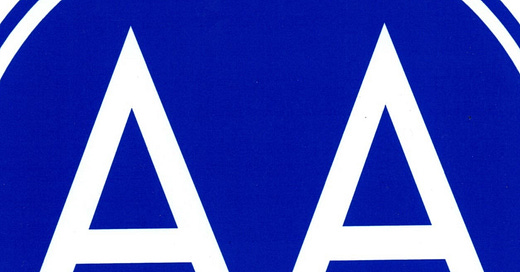AA Wasn’t My Answer... And That’s Not a Mistake
AA isn't for everyone, and this is why it didn't work for me.
Sobriety is not one size fits all… everyone’s journey is as unique as our fingerprints. I learned this the hard way and slowly. Fifteen years ago, I walked into my first AA meeting hoping to find a connection, guidance, maybe even relief. What I found instead was a room full of older white men. As a young woman carrying trauma I hadn’t yet named, I felt invisible and unsafe. Sitting in that circle, I felt my anxiety coil tighter. Why would I open up to a group of strangers who couldn’t possibly understand the landscape I was navigating?
They say AA is non-religious, but every meeting I attended began and ended with the Lord’s Prayer… a prayer rooted in Christian tradition and widely used in Catholic liturgy. And I needed space from a God I was so angry at. For someone trying to leave behind painful associations, this felt more like a spiritual ambush than a safe space. And it felt like a lie. I didn’t want to sit for an hour and dissect the very things I was trying so hard to heal from.
AA meetings offered a sense of community, but with contradictions. One week, you might sit beside someone with 30 years of sobriety and wisdom. Next, a person reeking of alcohol, barely present, and struggling to sit upright. Not to say that person shouldn’t be there… But…that mix was hard for me. I needed consistency, not reminders of the chaos I was trying to escape.
I kept trying AA because for so long, it felt like the only option. It was created in 1935 by two white men, Bill Wilson and Dr. Bob Smith, and nearly a century later, it remains the most recognized recovery model. That dominance makes it feel like a standard you must follow. And when you don’t fit in, or it doesn’t work for you, it’s easy to feel like you’ve failed.
For over ten years, I tried to find a home in AA, and I never did. And that’s okay.
What I did learn is that recovery requires support and connection. However, not everyone's support system is found in AA meetings. I found strength in close sober friends and family, the people who saw me fully and held space when I couldn’t. I didn’t need to dissect my drinking every week. What I needed… what made recovery possible, was mental health care, emotional stability, and the right combination of medications. Until then, sobriety wasn’t just difficult. It was impossible.
And it wasn’t just internal pressure… it was institutional. When I got into legal trouble, AA was offered. Every rehab I went to provided AA. I’ve held a room in more than a few places, and it was always AA. Even my family worried when I stopped going, not out of judgment, but concern. Because culturally, we’re taught that AA is the gold standard. That if you’re not “working the program,” you must be slipping.
It was hard not to internalize the message: the more meetings you attend, the “better” you are, as if healing could be measured in attendance sheets and folding chairs. But healing isn’t transactional. It’s not a punch card. I wasn’t skipping out, I was carving my own path, one built on self-trust and tools that worked for me.
There are other paths, like SMART Recovery, which is science-based and secular, and Refuge Recovery, which draws from Buddhist principles and emphasizes mindfulness. These programs don’t ask you to surrender to a higher power or relive trauma in a group setting. But they’re harder to find and often overlooked, especially outside major cities.
Recovery should be about choice, not shame. About empowerment, not conformity. I didn’t fail AA. AA just wasn’t right for me.




Love this piece as someone who does use AA, but has plenty of criticism to lodge at it. The membership demographics are embarrassing for a group that had ideas that, at the time of its conception, were actually pretty radical. The institution calcified pretty quickly and is powerfully resistant to change. I'm just glad there are other organizations and methods people can use today to support them in recovery and sobriety.
The thing with my journey is that I USE AA. Like a tool. I don't buy into all the dogma. I have a sponsor who questions it as much as I do. I also live in an area where you never hear The Lord's Prayer in meetings, and many people are New Agers, hippies, Buddhists, and the like, with a smaller proportion of dogmatic Christians. Also, people here tend to use thoughtful, nuanced language around addiction and recovery, and generally approach the program with openness. It's very different than any other place I've tried AA out, where it only worked in the shallowest sense of telling me what to do when I was too beat down and desperate to come up with anything on my own, and never stuck once the immediate horror of my situation had improved. It's still AA, warts and all, but it's an AA that feels genuinely inclusive and thoughtful, which is what keeps me coming back. If it weren't, I'd be doing something else. I wish this were the case everywhere, but it most definitely is not.